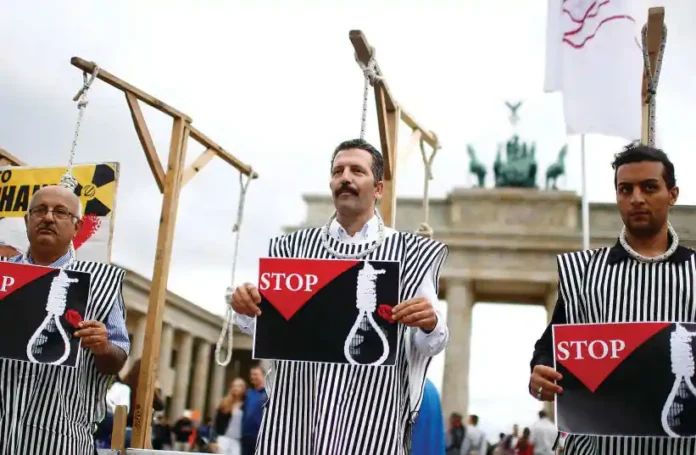Tehran, August 7, 2024 — In a dramatic and chilling display of its judicial power, Iran executed at least 29 individuals on Wednesday, including a mass hanging of 26 men at Ghezelhesar Prison near Tehran.
This mass execution follows a wave of international condemnation over the recent execution of Gholamreza Rasaei, a man connected to the 2022 protests.
The executions were reported by Norway-based Iran Human Rights (IHR) and corroborated by the US-based Human Rights Activists News Agency (HRANA) and the Center for Human Rights in Iran.
IHR detailed that 26 men were hanged in Ghezelhesar Prison, while an additional three were executed in Karaj’s city prison. Among the executed were two Afghan nationals convicted of serious crimes such as murder, drug offenses, and rape.
Mass Executions in Ghezelhesar Prison
Ghezelhesar Prison, located in Karaj, has been a focal point for Iran’s mass executions.
The prison has witnessed some of the largest scale executions in the country, with this latest event being the most significant in recent years.
Reports indicate that the 26 men hanged were convicted of various crimes, although detailed information about their individual cases remains sparse.
The secrecy surrounding the proceedings highlights the lack of transparency in Iran’s judicial system.
The executions at Ghezelhesar were reportedly carried out in a single day, reflecting the efficiency and severity with which Iran handles its death penalty cases.
This mass execution has been described as a demonstration of the state’s resolve in maintaining strict judicial control, even amidst growing international scrutiny.
Additional Executions in Karaj
In addition to the Ghezelhesar executions, three other individuals were executed in Karaj’s city prison. This brings the total number of executions on Wednesday to 29.
Among those executed were two Afghan nationals, a detail that has drawn attention from international human rights organizations due to the involvement of foreign nationals in Iran’s judicial actions.
The HRANA and IHR reports confirm that at least 24 people were executed in Karaj, further emphasizing the scale of the state’s use of capital punishment.
The reasons behind the specific selection of these individuals for execution remain unclear, but it is evident that Iran continues to employ the death penalty as a tool of judicial and political power.
International Reaction and Human Rights Concerns
The mass executions have elicited strong reactions from human rights organizations and international bodies. Mahmood Amiry-Moghaddam, director of Iran Human Rights, warned of the dire implications of such large-scale executions.
“Without an immediate response from the international community, hundreds of individuals could become victims of the Islamic Republic’s killing machine in the coming months,” he stated.
Amiry-Moghaddam emphasized that the scale of Wednesday’s executions had not been seen in Iran since 2009, marking a troubling escalation in the country’s use of the death penalty.
Human rights advocates have condemned Iran’s actions as a gross violation of human rights.
The executions come in the wake of international backlash over the execution of Gholamreza Rasaei, who was convicted of killing a Revolutionary Guard during the 2022 protests.
Activists argue that Rasaei’s confession was extracted under torture and that his execution was a politically motivated act of repression.
Diana Eltahawy of Amnesty International criticized the execution of Rasaei as “abhorrent and arbitrary,” describing it as part of Iran’s broader strategy to use the death penalty for political repression.
Eltahawy highlighted that Rasaei’s confession, allegedly obtained through torture, was ignored in court, underscoring the lack of fair trial standards in Iran.
France and the United States have also condemned Rasaei’s execution, reiterating their opposition to the death penalty.
Both nations have called for international pressure on Iran to halt its use of capital punishment and to address the human rights abuses within its judicial system.
Political and Social Implications
The timing of the mass executions, occurring just a day after international condemnation of Rasaei’s execution, suggests a calculated response by the Iranian government.
The Iranian regime appears to be leveraging the international focus on its tensions with Israel to intensify its domestic repression.
This tactic aligns with the broader pattern of using high-profile international issues as a distraction from internal human rights abuses.
Since the appointment of President Masoud Pezeshkian last week, Iran has executed at least 345 people this year, according to IHR.
This surge in executions underlines the regime’s determination to assert its authority and control, particularly in the context of ongoing domestic unrest and international criticism.
The use of capital punishment in Iran has long been a subject of controversy. The country’s high execution rate is second only to China, and its judicial practices have drawn widespread criticism from human rights organizations.
Iran’s broad application of the death penalty, often for crimes that do not warrant such severe punishment, is seen as a means of instilling fear and maintaining control over its population.
Conclusion
The mass execution of 29 individuals in Iran on Wednesday represents a grim reminder of the country’s ongoing human rights issues.
The scale and timing of these executions highlight the Iranian government’s strategy of using the death penalty as a tool of repression.
As international criticism mounts, the global community faces the challenge of addressing Iran’s human rights abuses while navigating the complexities of geopolitical tensions.
This article was created using automation technology and was thoroughly edited and fact-checked by one of our editorial staff members

